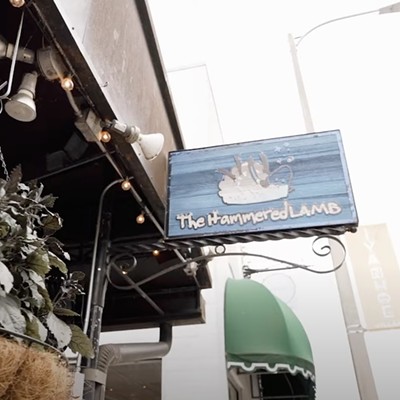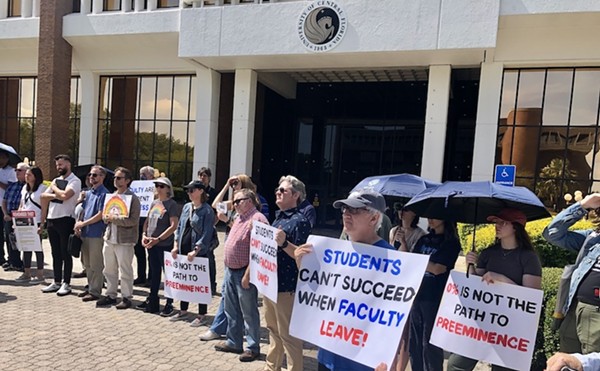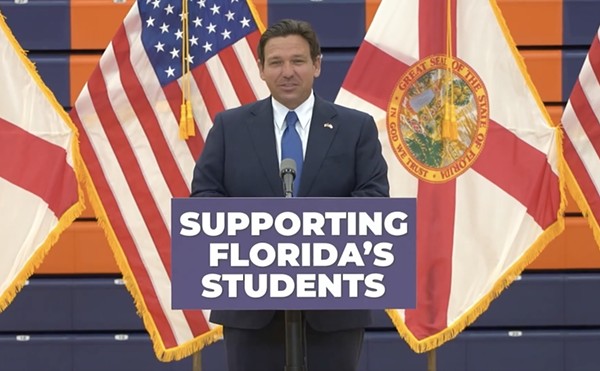A gay college student in Wyoming is brutally beaten and left to die tied to a fence. A gay Orlando man says he is attacked by thugs in his home. Several African-American families in Pine Hills find their homes have been vandalized and wonder if hate is the motive.
Hate crimes have been increasingly making the news, but are hate crimes on the rise?
The answer depends on who is doing the record keeping and how carefully you look at the numbers.
According to a report by the state Attorney General's Office, in 1997 the total number of hate crimes fell 44 percent from the previous year. The 119 incidents last year represent the lowest number since 1991, when data began being compiled, and the figure is a dramatic drop from 1992, when the number of reported incidents peaked at 395.
Within that overall bit of good news, however, there is an unsettling statistic.
While the numbers of hate crimes targeting people because of race, religion or ethnicity have slid anywhere from 50 to 75 percent, the incidents of crime motivated by sexual orientation rose an astonishing 167 percent.
That final statistic is in keeping with figures gathered by Central Florida's Gay, Lesbian and Bisexual Community Center (GLBCC). During 1997, according to GLBCC board president Penny Reed, 16 hate crimes were reported. So far in 1998, she says, there have been some 30 complaints.
She sees a twofold reason for the rise. Increasing anti-gay rhetoric from the religious right "helps inflame people" to act on their prejudice, thereby producing more attacks, while a more visible and organized gay and lesbian community makes people feel more comfortable going to authorities to report the crimes.
The connection between visibility and fear can be seen locally in the experience of Mike McKee, an Orange County teacher who publicly came out in January and since has become a frequent guest speaker to community groups. McKee admits he is looking over his shoulder a little more often. "I do realize that with the attention that I am getting that I could be a target," says McKee. "Is that going to stop me? No."
Even when it comes to the larger category of all types of hate crimes, the numbers need a close look. Nikki Frenney, spokesperson for the Orlando office of the Florida Department of Law Enforcement, says the apparent statewide decrease doesn't actually indicate a huge reduction in the number of hate crimes.
For one thing, Frenney says, fewer police agencies are supplying hate-crime data to the state. Last year there was a 24 percent drop in the number of agencies reporting. Another major factor, she says, is that many rank-and-file officers simply are still not well-educated on what exactly constitutes a hate crime, and therefore many incidents don't get classified as such.
Similarly, a decade ago, although there were few reported incidents of domestic violence, no one assumes fewer punches were being thrown. Back then, law enforcement officers simply didn't know how to properly classify what they saw. The same holds true for hate crimes, says Frenney. "It is not that they don't care; it is just, how do you report them?"
Beyond the problems with reporting lie difficulties with prosecution. Randy Means, spokesperson for the State Attorney's Office for Orange and Osceola counties, says even if a hate crime is reported it's a challenge to clearly delineate motive before the courts. Only a handful of hate crimes have been prosecuted in recent years, he says.
Unlike some other states, hate crimes in Florida are not filed as separate charges. If hate or prejudice is found to be an "essential factor" in a crime in Florida, the penalties for that crime may be stiffened. For example, he says, if a person facing a misdemeanor battery charge is found to be motivated primarily by prejudice, that person could then face a third-degree felony.
Whatever the difficulties in keeping accurate counts, the death of Wyoming college student Matthew Shepard is "a turning point," according to Wayne Bessen, a spokesperson for the Human Rights Campaign, one of the nation's largest gay and lesbian lobbying organizations. It will prompt people -- both gay and straight -- to "take greater action" to ensure others don't suffer similar fates, Bessen says.
McKee, the 1996-97 Teacher of the Year at Cypress Creek High School, says education is the answer. Not only do law enforcement officers need to be educated about how to classify hate crimes, the public in general needs to look at subtle ways prejudice against gays in reinforced. "I feel a responsibility to make sure what happened [in Wyoming] doesn't happen here," says McKee.

















